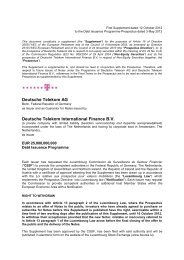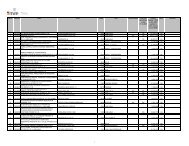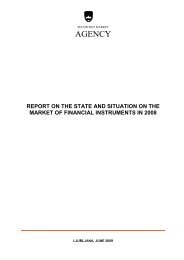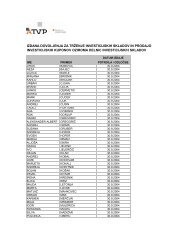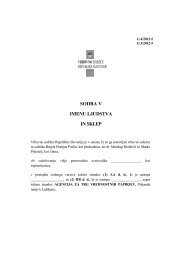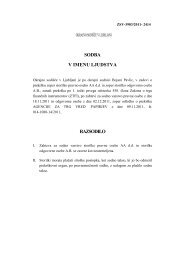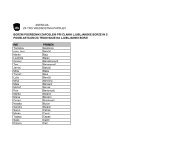The decrease in the number of mobile customers in 2010 was due to the deactivation of around 8.3million inactive prepay customers' cards, which enabled Deutsche Telekom to reduce theadministrative costs related to these inactive accounts. The number of contract customers remainedstable at 17.2 million, which Deutsche Telekom attributes to its extensive selection of smartphonesand its enhanced integrated rate plans for voice telephony and data services. For example, in 2010,Deutsche Telekom began selling the iPhone 4 in Germany. With a mobile penetration rate in Germanyof well over 100%, the strategy in Deutsche Telekom's German mobile operations is to continue tofocus on higher-value contract customer business.- ConsumersIn the consumer business, Deutsche Telekom's Germany operating segment focuses on high-valuecustomers who purchase both fixed-network services such as Internet and TV products (e.g.,Entertain) and mobile services with integrated flat rates for data. Since the end of 2010, DeutscheTelekom has offered its customers a fixed-network calling plan (Call & Surf Comfort) with morebandwidth.In mobile communications, Deutsche Telekom has upgraded the service content of the contracts, andat the end of 2010, Deutsche Telekom started to offer an entry-level double-play package with a dataflat rate for the mobile Internet (Call & Surf Mobil). In the new mobile communications portfolio,packages with integrated data flat rates for the mobile Internet (Call & Surf Mobil and Complete Mobil)have sold well. Newly introduced special packages (e.g., Special Call & Surf Mobil) have also beenwell received by contract customers. The sale of SIM cards to resellers also increased in 2011.- Business CustomersIn 2011, line losses in the business customers segment remained at the prior-year level. Also, manycustomers are switching from pure voice telephone lines to double-play products with flat rates fortelephony and Internet, which means they use higher-value calling plans, such as Business Complete.In addition, Deutsche Telekom introduced a new set of mobile calling plans for its business customersin February 2011. With a clear focus on calling plans with integrated data flat rates for the mobileInternet, this helped to increase subscriber numbers compared with 2010.- WholesaleOverall, the various wholesale products Deutsche Telekom is required to provide to its competitors bythe regulator, such as ULLs and unbundled access lines, increased. Network infrastructure providersrequire ULLs for their customer access and the number of ULLs increased by 1.1% in 2011. Thenumber of Deutsche Telekom's bundled wholesale lines declined in 2011, while Deutsche Telekomrecorded an increase in unbundled products. Deutsche Telekom expects this trend to continue for thenext few years, in particular due to the fact that its competitors are switching from bundled tounbundled wholesale products in order to improve their service to their own end-customers. DeutscheTelekom also expects the number of ULLs to increase as well. The results of regulatory decisions areexpected to continue to have an effect on demand for Deutsche Telekom's wholesale products.In 2010, the increase in ULLs resulted from a migration of competitors to all-IP lines. The number ofDeutsche Telekom's bundled wholesale lines declined in 2010 and 2009 as competitors switched frombundled to unbundled wholesale products to improve their own services.- CompetitionDeutsche Telekom's fixed-network operations in Germany face intense competition based primarily onprice in the market for fixed-line network voice telephony and broadband services. Continuedcompetition in the fixed-network market has led to higher service levels and lower prices, intensifyingthe downward pricing pressure on Deutsche Telekom's own products and services. In addition, asprices for mobile telephony decline, local and other calling services, as well as access services, faceincreasing competition from mobile telephone operators, due to mobile substitution. These factors,combined with the continued implementation of regulatory policies intended to foster greatercompetition, are expected to result in similar trends in the future. In addition, the German mobilecommunications market is saturated in terms of customers and Deutsche Telekom faces intensecompetition from other mobile network operators and MVNOs.82
Development of Operations2011 2010 Change Change(millionsof €)(millionsof €)(millionsof €) (%)Total revenue 24,031 25,145 (1,114) (4.4)Consumer (1) 12,584 13,109 (525) (4.0)Business Customer (1) 5,613 5,661 (48) (0.8)Wholesale 4,207 4,553 (346) (7.6)Digital <strong>Services</strong> 749 866 (117) (13.5)Value-Added <strong>Services</strong> 417 498 (81) (16.3)Other 461 458 3 0.7Profit from operations (EBIT) 4,445 4,916 (471) (9.6)Depreciation, amortisation andimpairment losses(4,447) (4,193) (254) (6.1)EBITDA 8,892 9,109 (217) (2.4)Special factors affecting EBITDA (2) (707) (509) (198) (38.9)EBITDA (adjusted for specialfactors) 9,599 9,618 (19) (0.2)Cash capex (3,644) (4,765) 1,121 23.5Average number of employees 76,028 79,364 (3,336) (4.2)(1)In connection with the One Company initiative, Deutsche Telekom has reported revenue for the consolidated customer areasin Deutsche Telekom's Germany operating segment, beginning with the first quarter of 2011. Prior-year figures have beenadjusted for better comparability.(2)For more information on special factors affecting EBITDA, see "Reconciliation of EBITDA and adjusted EBITDA".- Total RevenueThe decline in total revenue in 2011 primarily reflects the downward trend in voice telephony, both inthe mobile business and the fixed-network business. Price effects resulting from regulatory decisions,such as the reduction in termination rates from December 2010 and the decrease in interconnectionprices in July 2011, negatively affected revenue development. For example, the negative effect fromthe decrease in mobile termination rates in the German mobile market totalled more than EUR 0.2billion. Furthermore, Deutsche Telekom discontinued selling prepaid mobile cards of its competitors.Continued demand for broadband services in the fixed-network and in mobile communications partiallyoffset the negative effects on revenue. In mobile communications, data revenues rose as a result ofsmartphone sales. An increase in revenue from Entertain partially offset the overall decline inrevenues.The main reasons for the decline in revenue from Deutsche Telekom's consumers business in 2011and 2010 were the continuing loss of fixed-network lines and the reduction of termination rates inmobile communications. The decrease was partially offset by growth in television and mobile-datarevenues. In 2010, the first time consolidation of STRATO, a web hosting provider, also had anoffsetting effect.The main reason for the decline in revenue from Deutsche Telekom's business customers in 2011 wasthe reduction in mobile termination rates. Growth in mobile-data and broadband revenue almostentirely offset the decline in revenue from traditional fixed-network voice telephony. The growth inrevenue in 2010 mainly resulted from growth in both mobile communications and the fixed-network.83
- Page 1 and 2:
Debt Issuance Programme ProspectusD
- Page 3 and 4:
Responsibility StatementDeutsche Te
- Page 5 and 6:
to form and content, and all rights
- Page 7 and 8:
Maturities:Form of Notes:Fixed Rate
- Page 10 and 11:
Summary in respect of Risk FactorsR
- Page 12 and 13:
Notes may not be a suitable investm
- Page 14 and 15:
Internationalisation and Sustainabi
- Page 16 and 17:
German Translation of the SummaryDi
- Page 19 and 20:
Besteuerung:Vorzeitige Rückzahlung
- Page 21 and 22:
Zusammenfassung der RisikofaktorenZ
- Page 23 and 24:
Zusammenfassung der Risikofaktoren
- Page 25 and 26:
Unternehmen aus diesem Grund zusamm
- Page 27 and 28:
Risk FactorsProspective investors s
- Page 29 and 30:
markets. These developments could,
- Page 31 and 32: consumer regulation at the federal
- Page 33 and 34: Existing mobile substitution effect
- Page 35 and 36: exacerbated by the global economic
- Page 37 and 38: are subject to several individual l
- Page 39 and 40: While Deutsche Telekom believes tha
- Page 41 and 42: exposed to the risk of an unfavoura
- Page 43 and 44: principal under such Notes may even
- Page 45 and 46: Statement of cash flows (page 9 in
- Page 47 and 48: otherwise agreed between the Issuer
- Page 49 and 50: DESCRIPTION OF BUSINESSGroup Organi
- Page 51 and 52: In February 2011, T-Mobile Czech Re
- Page 53 and 54: 2010. The demand for ever-faster da
- Page 55 and 56: Special Requirements Applicable to
- Page 57 and 58: Local Loop AccessDeutsche Telekom h
- Page 59 and 60: Incumbent network operators are obl
- Page 61 and 62: (e.g., avoid disclosure or blocking
- Page 63 and 64: PTC as Deutsche Telekom clarified t
- Page 65 and 66: combinations of businesses where De
- Page 67 and 68: For more information on the effects
- Page 69 and 70: • Other operating expenses increa
- Page 71 and 72: 345Includes expense relating to a c
- Page 73 and 74: investment levels to remain approxi
- Page 75 and 76: products and technologies, these in
- Page 77 and 78: Reconciliation of Net Debt31 Dec. 2
- Page 79 and 80: Deutsche Telekom's cash outflows fo
- Page 81: 1In addition to the fixed-network l
- Page 85 and 86: to upgrade its mobile network, prov
- Page 87 and 88: Czech Republic. Deutsche Telekom ha
- Page 89 and 90: decrease mobile termination rates,
- Page 91 and 92: The decrease in adjusted EBITDA in
- Page 93 and 94: In 2011, the United States operatin
- Page 95 and 96: The increase in total revenue in 20
- Page 97 and 98: solutions. It also manages and deve
- Page 99 and 100: In 2010, T-Systems substantially ex
- Page 101 and 102: 2011 2010 Change ChangeOf which: Vi
- Page 103 and 104: conditions for additional capital m
- Page 105 and 106: For additional information on the c
- Page 107 and 108: Employees in the Group 31 Dec. 2011
- Page 109 and 110: Civil servants employed by Deutsche
- Page 111 and 112: Selected Financial InformationDeuts
- Page 113 and 114: (Vorlagebeschluesse) with respect t
- Page 115 and 116: Court of Justice annulled these jud
- Page 117 and 118: having to pay license fees and comp
- Page 119 and 120: Civil ServantsIn November 2004, Ger
- Page 121 and 122: majority holdings by 2 May 2015, on
- Page 123 and 124: Group Accounting manages the proces
- Page 125 and 126: Deutsche Telekom International Fina
- Page 127 and 128: Statement of comprehensive incometh
- Page 129 and 130: Terms and ConditionsThis Series of
- Page 131 and 132: "Global Note" means [the/any] [Temp
- Page 133 and 134:
interest shall continue to accrue o
- Page 135 and 136:
7 February 1992), the Amsterdam Tre
- Page 137 and 138:
Period is a day other than the 30th
- Page 139 and 140:
[in the case of Definitive Notes in
- Page 141 and 142:
([4]) of this § 6.](b)Notice of re
- Page 143 and 144:
of Stock Exchange], a Paying Agent
- Page 145 and 146:
(f)(g)the Issuer [in the case of No
- Page 147 and 148:
§ 14[(5)] to the Agent. Such notic
- Page 149 and 150:
Garantin] noch der Fiscal Agent ode
- Page 151 and 152:
Bei Rückzahlung oder Zahlung einer
- Page 153 and 154:
(b)Fällt ein Zinszahlungstag auf e
- Page 155 and 156:
[Sofern eine andere Methode der Bes
- Page 157 and 158:
[im Falle von Actual/360: die tats
- Page 159 and 160:
Für diese Zwecke bezeichnet "Zahlt
- Page 161 and 162:
Eine solche Kündigung darf allerdi
- Page 163 and 164:
(i)[Referenz-Preis einfügen] (der
- Page 165 and 166:
[(e)(f)von einer Zahlstelle abgezog
- Page 167 and 168:
(b)(c)(d)die Nachfolgeschuldnerin a
- Page 169 and 170:
eine vertretungsberechtigte Person
- Page 171 and 172:
(d)(e)(f)(iii)(iv)(v)(vi)by reason
- Page 173 and 174:
Non-binding translation of the Guar
- Page 175 and 176:
ganz oder teilweise in irgendeiner
- Page 177 and 178:
Tag der Begebung: [ ]These are the
- Page 179 and 180:
CURRENCY, DENOMINATION, FORM AND TI
- Page 181 and 182:
INTEREST (§ 4) 8ZINSEN (§ 4)o Fix
- Page 183 and 184:
oooooo ISDA Determination 9ISDA-Fes
- Page 185 and 186:
Instalment Amount(s)Rate(n) [ ]Earl
- Page 187 and 188:
GOVERNING LAW (§ 14)ANWENDBARES RE
- Page 189 and 190:
German Securities Code [ ]Deutsche
- Page 191 and 192:
Umfassende Erläuterung darüber, w
- Page 193 and 194:
Various categories of potential inv
- Page 195 and 196:
Commissions 29ProvisionenManagement
- Page 197 and 198:
Die Emittentin hat die Informatione
- Page 199 and 200:
Payment of the flat income tax will
- Page 201 and 202:
Kingdom of the Netherlands.Where th
- Page 203 and 204:
ResidentsAccording to the law of 23
- Page 205 and 206:
(c)account or benefit of, U.S. pers
- Page 207 and 208:
4. United KingdomEach Dealer has re
- Page 209 and 210:
Names and AdressesIssuersDeutsche T
- Page 211:
2010 2010PricewaterhouseCoopers Akt




